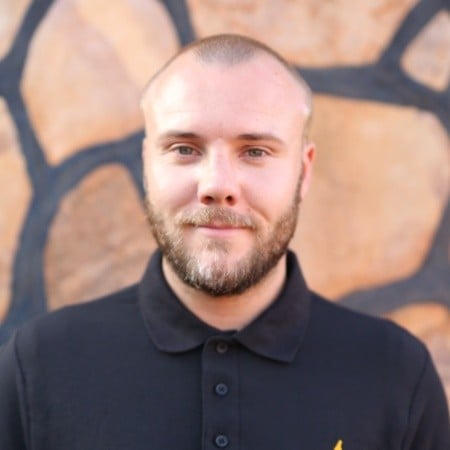Thomas Delap, 35, Head of North Paddington Foodbank
Thomas from Manchester, began his career in the music industry as a producer for BBC Radio 1 before embarking on a life-changing journey to India. After a couple of months of travel, he fell in love with Mumbai and a small charity, the OSCAR Foundation, which worked in the slums to support young people through football. Thomas ended up staying in Mumbai for 4 years, which marked the beginning of his career in the charity sector. Over time, he moved into fundraising, service development, and project delivery, working to address societal issues and bring about meaningful change in communities.
Thomas later worked in Uganda with Brass for Africa, at Terrence Higgins Trust, and then as Head of Libraries at Haringey Council, where he led a range of community initiatives. After these roles, he took on the position of Head of North Paddington Food Bank (NPFB) three years ago. During his time at NPFB, he has led the charity’s pioneering shift to a cash-first food bank model, making it the first and only food bank to adopt this innovative approach.
Under his leadership, NPFB has successfully secured funding and support from major partners for Cash First, including Westminster Council, The National Lottery, the Mayor of London, the Greater London Authority (GLA), and Turn2us.
Get in the Know
Subscribe to our newsletter
1. What inspired you to become involved with the North Paddington Food Bank?
During the lockdown, I was Head of Library Services for Haringey Council, and when libraries had to close, I stepped in to manage the emergency food distribution efforts at Alexandra Palace and Tottenham Hotspur Stadium. It was a massive operation, delivering over 50,000 food parcels weekly. That experience profoundly shaped me—I saw firsthand the scale of food insecurity in our communities and how vulnerable people were, even in one of the world’s wealthiest cities.
It’s heartbreaking to think that people, particularly children, go hungry every day. When the opportunity arose to lead North Paddington Food Bank, one of the largest food aid charities in the UK, it felt like a natural next step. I’m passionate about tackling poverty and food insecurity, and I couldn’t pass up the chance to drive change at such a critical organisation.
2. What’s been the most significant moment or milestone in your career that led you to this role?
The pivotal moment for me was during the pandemic when I saw the incredible impact community-led emergency food aid efforts could have on people’s lives. Running such a large-scale operation during a crisis was challenging but deeply rewarding. That experience gave me a clear sense of purpose: I wanted to work on the frontline of tackling poverty and food insecurity.
Joining NPFB has allowed me to channel that experience into longer-term, sustainable solutions, particularly through our innovative cash-first approach.
3. As the head of a community-focused charity, what are some of the biggest challenges you face in meeting local needs, and how do you navigate them?
One of the biggest challenges is the sheer scale of need versus the resources available. Westminster is an area of stark contrasts, with extreme wealth sitting alongside extreme poverty. Approximately 43% of residents live in poverty, and more than 33,000 households are at risk of food insecurity.
Navigating this requires prioritisation, collaboration, and innovation. We rely on data to identify the most vulnerable households and target support effectively. We also focus on partnerships—with other charities, local authorities, and businesses—to maximise our impact and avoid duplicating efforts. It’s about staying adaptable and working creatively to meet rising demand.
4. The food bank has adopted an innovative ‘cash-first’ approach; could you explain why this model was chosen and how it impacts the people you serve?
Our cash-first approach is rooted in dignity, autonomy, and addressing the root causes of poverty. Instead of focusing solely on emergency food parcels, we provide direct financial support to families in crisis. This gives people the flexibility to buy what they need most—whether that’s food, nappies, or utilities. It’s not just about addressing immediate hunger; it’s about empowering people to regain control of their lives and reducing their reliance on food aid in the long term.
Our pilot project has shown incredible results: a 79% reduction in emergency food aid requests and a 55% decrease in repeat use of the food bank. These outcomes show that a cash-first approach can create real, sustainable change.
5. Westminster is a large area to cover. How do you prioritise where resources and support are best focused, especially when demand exceeds supply?
We use a data-driven approach to identify and target areas with the greatest levels of deprivation, such as Westbourne Grove, Harrow Road, and Queen’s Park—some of the most disadvantaged communities in the country. To ensure our support reaches those who need it most, our outreach teams work closely with Westminster Council, local schools, housing associations, and other support services. Together, we identify households at the highest risk of crisis.
Our interventions are carefully tailored to meet immediate needs and provide sustainable solutions. This includes financial support through cash grants or supermarket vouchers, alongside holistic wraparound services such as housing advice, debt management, energy support, and income maximisation. We also assist individuals with navigating the benefits system, including appeals and sanctions, to ensure they receive what they’re entitled to.
Collaboration is central to our approach—it allows us to pool resources, address gaps in provision, and ensure no one falls through the cracks. By leveraging partnerships and focusing on high-need areas, we can make a meaningful impact even when resources are stretched.
6. Running a high-demand charity can be intense. How do you avoid burnout and maintain your own resilience and motivation?
It’s certainly a demanding role, and sometimes the sheer scale of the problem can feel overwhelming. When you think about the number of people and families who rely on our services to ensure they don’t go hungry or have to live without heating in their homes, it’s a heavy responsibility. On top of that, there’s the constant focus on the welfare of my own team—making sure they feel supported while also ensuring we secure enough funding to keep everyone employed and the organisation running.
In my three years here, I’ve been able to grow our income and impact by more than 400%, which I’m incredibly proud of. But with that growth comes the challenge of sustaining it, meeting rising demands, and constantly striving to do more. It’s a lot to carry, and it’s not always easy.
What keeps me grounded and motivated is the incredible team I work with. We’re constantly innovating, and the fact that we’ve built a solution—the cash-first approach—that we now know truly works makes it all worth it. It gives us purpose and a renewed drive every day to keep going.
On a personal level, I make sure to take moments to recharge. Spending time with my family and friends, walking my dog, and going for a swim help me find balance. Reflecting on the positive impact we’ve made and hearing success stories from the people we’ve helped is a reminder of why this work is so vital. It’s those moments that allow me to push forward, even when the challenges feel overwhelming.
7. Can you share a specific setback in your career, and how you used that experience to learn and grow?
Setbacks have been some of my greatest teachers, shaping how I approach challenges and lead today. One of the most defining moments came during the pandemic when I was overseeing one of the largest food distribution operations in London. We were delivering over 50,000 food parcels a week, a lifeline for thousands of vulnerable households. Then, without warning, a key supplier failed to deliver.
It was a moment of crisis—time was short, demand was surging, and people were relying on us. The weight of that responsibility was enormous, but instead of panicking, I focused on finding solutions. I activated every contact in my network, engaged new partners, and within 24 hours, we restructured our supply chain to ensure no one went without essentials.
That moment was a crash course in resilience, creative problem-solving, and the value of strong, trusted partnerships. It reinforced an important lesson I’d learned early in my career: success isn’t about avoiding challenges but about how you adapt and respond to them.
Rejection has been another key driver of my growth. In my 20s, I experienced quick success, particularly in international development. I lived in Mumbai for four years, where I helped grow a small NGO into the largest sports-focused nonprofit in Southeast Asia. It was an incredible experience that gave me confidence and a sense of purpose. But when I returned to the UK, things didn’t go as smoothly.
I applied for countless big roles that I was passionate about, only to face rejection time and again. I often made it to the interview stage, but I wasn’t getting hired. Each rejection stung, and I had to endure a tough year of introspection and self-doubt. But rather than let it defeat me, I saw each rejection as a chance to learn. I reassessed my approach, improved my communication skills, and developed a sharper awareness of how I presented myself and my work. Those lessons became a foundation for my career, teaching me resilience, self-awareness, and how to thrive under pressure.
Fast forward to today, and those hard-earned lessons have paid off. As the main fundraiser, head of a growing charity, and leader of multiple services at NPFB, I now operate in a high-pressure environment where my success rate is above the industry average. But that success didn’t come overnight. It’s the result of over a decade of learning from mistakes, refining my craft, and finding strength in moments of failure.
This role is demanding—there’s no sugar-coating that. We’re a small team with big ambitions, growing quickly and tackling significant challenges every day. But I thrive in this environment because of the setbacks I’ve faced and overcome. Those experiences taught me that growth often comes from the hardest moments and that perseverance is key. It’s that mindset—resilience, creativity, and adaptability—that I bring to my work at NPFB every single day.
8. How do you go about building your team and maintaining relationships with donors, volunteers, and local businesses to help sustain your operations?
Building a strong team starts with finding people who truly believe in the mission. Skills can be taught, but passion and alignment with our values are non-negotiable. I foster a culture of transparency, empowerment, and collaboration—everyone on the team knows their contributions matter, and I make sure to recognise and celebrate their efforts regularly.
For donors, volunteers, and local businesses, it’s all about connection. People need to see the real impact of their contributions, so I prioritise regular updates, invite them to visit our operations, and make them feel like part of the NPFB family. For example, I personally host engagement events where they can hear directly from the people their support has helped. It’s about creating shared ownership of our mission and building genuine, lasting partnerships based on trust and shared purpose.
Sustainability comes from relationships—internally with the team, and externally with the community. Everyone needs to feel valued and connected to the mission. That’s how we’ve been able to grow and sustain our work.
9. Looking ahead, what are the long-term goals for the food bank, and what steps are you taking to achieve them over the next few years?
The ultimate goal is bold but clear: to make food banks unnecessary by addressing the root causes of poverty. That starts with scaling up our cash-first model, which has already reduced repeat food bank use by 55%. This model empowers people to manage their own crises while also addressing the immediate issue of food insecurity.
Over the next few years, we’re focusing on three core areas:
- Expanding Wraparound Support – By increasing access to services like welfare benefits advice, debt relief, housing support, and mental health care, we can address the underlying issues driving people into poverty
- Community Empowerment – We’re piloting initiatives like community cooking classes and peer support groups to help people build resilience, share skills, and foster community connections
- Advocacy for Systemic Change – We’re ramping up efforts to influence policy by using the data and stories we’ve gathered from the people we serve. We want to push for changes that tackle the structural inequalities causing poverty, from the benefits system to housing policy.
Our approach isn’t just reactive—it’s proactive. We’re here to meet immediate needs, but we’re also taking tangible steps to build long-term solutions so fewer people end up needing us in the first place.
10. Finally, what would you say is the most rewarding part of leading the North Paddington Food Bank, and what advice would you give to others looking to make a meaningful impact in the non-profit sector?
The most rewarding part is hearing the stories of transformation. When someone tells us, “I don’t need to come to the food bank anymore because I’ve found stability,” that’s everything. It’s those moments that remind me why we do this—it’s not just about handing out food; it’s about restoring dignity, hope, and independence to people who’ve felt overlooked and left behind.
My advice to others in the non-profit sector is this: stay close to the mission and the people you’re serving. It’s easy to get caught up in targets and reports, but the real work happens on the ground, face-to-face with the people you’re trying to help. Build strong partnerships, stay resilient in the face of setbacks, and surround yourself with people who share your passion.
And lastly, never underestimate the power of small wins. Whether it’s helping one family get back on their feet or sparking a conversation that leads to systemic change, every action matters. This work can be challenging, but the impact—both on the community and on yourself—is life-changing.




